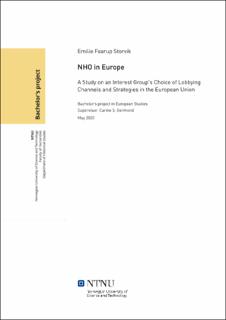NHO in Europe: A Study on an Interest Group's Choice of Lobbying Channels and Strategies in the European Union
Bachelor thesis
Permanent lenke
https://hdl.handle.net/11250/2775521Utgivelsesdato
2020Metadata
Vis full innførselSamlinger
Sammendrag
Denne oppgaven tar for seg Næringslivets Hovedorganisasjons (NHO) lobbyvirksomhet mot den Europeiske Union. Oppgaven vil se på NHOs lobbing inn mot den Europeiske Unions sosialpolitikk og dens finansiering av forskning og innovasjon. For å gjøre dette vil oppgaven ta utgangspunkt i NHOs foretrukne lobbykanaler og strategier. Oppgaven sammenligner to casestudier, Lisboa-strategien og Horisont 2020, og ser på NHOs bruk av kanaler og strategier i hvert tilfelle. Lobbykanalene som ble sett på er BusinessEurope, Brussel-kontoret og den norske regjeringen. Strategier som er sett på er «voice» mot «access», informasjonslobbying og tilbud av teknisk ekspertise. Oppgaven konkluderer med at NHO foretrekker å bruke paraplyorganisasjonen BusinessEurope som den viktigste lobbykanalen, men bruker også den nasjonale regjeringen som en lobbykanal. I tillegg bruker NHO konsistent informasjonslobbying og teorien om tilgang som sin foretrukne strategi. Et overraskende funn i oppgaven var mangelen på litteratur om NHOs Brussel-kontor som lobbykanal under Lisboa-strategien og Horisont 2020-forhandlingene. This paper studies how the Confederation of Norwegian enterprises (NHO) lobbies the European Union. The study will look on the European Union’s social policy, and funds for research and innovation. To do this, the thesis will be based on NHO’s preferred lobbying channels and strategies. The thesis explores two case studies: the Lisbon Strategy and Horizon 2020. The lobbying channels looked at are BusinessEurope, NHO’s office in Brussels and the national government. Strategies looked at are voice versus access, informational lobbying, and provision of technical expertise. The thesis concludes that NHO prefers using its umbrella organisation BusinessEurope as the main lobbying channel but uses the national government as a lobbying channel as well. Additionally, NHO concisely uses informational lobbying, and the theory of access as its preferred strategy. A surprising finding in the thesis was the lack of literature on NHO’s Brussels office as a lobbying channel during the negotiations of the Lisbon Strategy and Horizon 2020.
